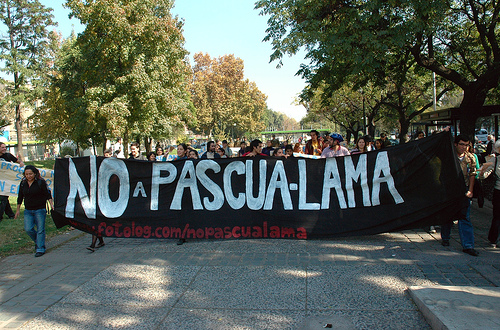Two of humankind’s most treasured resources–water and gold–have instigated a conflict between an indigenous community and a Canadian mining company over an isolated swath of Chile’s Atacama region.
Responding to the Diaguita community's plea, a Chilean court halted operations at one of South America's most promising gold mines last Wednesday, April 10, 2013. The action followed an investigation by the SEA (Environmental Superintendent) [es], which filed several charges against Minera Nevada, S.P.A., a subsidiary of Barrick Gold, for new and persistent violations.
In January, the company reported it had failed to properly construct a drainage system for acidic waste, where the SEA’s ground water tests subsequently proved contamination.
Environmentalists joined the opposition, reiterating that Barrick Gold’s $8.5 billion Pascua Lama mine is not worth grave damage to ancient hunks of glacial ice that serve as freshwater reserves for the Huasco Valley region. Netizens like civil engineer Francisco Navarro (@fconavarro1) [es] agreed:
@fconavarro1: Hay temas ambientales pendientes de Pascua Lama, s.e. es necesario hacerlo sustentable. Chile no puede darse gustitos de US$8500 millones
@fconavarro1: There are environmental issues pending in Pascua Lama, S.E. it is [sic] necessary to make it sustainable. Chile can’t afford US$8.5 billion treats
The day the court issued the injunction, Greenpeace Chile (@GreenpeaceCL) [es] celebrated a record 11,000 signatures on its online petition against the mine, as Trendsmap Santiago (@TrendsSantiago) [es] reported that #pascualama was trending.
(@GreenpeaceCL) Hasta cuándo podrá destruir nuestros recursos naturales? Dile #Noabarrickhttp://gpcl.org/noabarrick
(@GreenpeaceCL) How long will they destroy our natural resources? Say #Noabarrick http://gpcl.org/noabarrick
Greenpeace’s petition had surpassed 15,000 sponsors on Thursday afternoon, with many retweeting #NoaBarrick [es] (#NotoBarrick).
Although the country's economy has historically relied on its natural resources, resistance to exploitation has become its own trend in Chile, where courts quashed a popular movement against a multi-billion dollar hydroelectric dam last year.
Samuel Leiva, campaign coordinator for Greenpeace Chile, wrote an editorial called “¿Tiene coraje la nueva institucionalidad ambiental?” [es] (“Does the new environmental institution have courage?”) about the country’s new environmental framework–adopted in December 2012–for the Investigative Journalism Center (CIPER):
Al entrar en vigencia los Tribunales Ambientales y la Superintendencia de Medio Ambiente, la capacidad de revertir o al menos compensar los daños al medio ambiente tiene una oportunidad de ser realidad en un país que ha apuntado al crecimiento económico por sobre el debido cuidado de la naturaleza.
The enactment of the environmental tribunals and the Environmental Superintendent, the capacity to reverse or at least offset environmental damage has the opportunity to become a reality in a country that has put economic growth above the due care of nature.
Some believe the case of Barrick Gold–one of the largest of six violators the new enforcement has investigated to date–to be the first major test of the new system's efficacy. Chilean Senator Guido Girardi expressed [es] his doubts when the court’s swift response transcended that of the environmental ministry:
La autoridad ambiental está siendo superada, Pascua Lama fue paralizada por los tribunales. Esto no fue resuelto ni por la autoridad de salud, ni por la autoridad ambiental habiendo evidencia de contaminación del agua. Esto sólo es reflejo de la debilidad de nuestra institucionalidad, debemos sacar una Ley que proteja los glaciales como bien nacional de uso público.
The environmental authority is being overcome: Pascua Lama was paralyzed by the courts. It was not resolved by the health authority, nor by the environmental authority having evidence of water contamination. This only reflects the weakness of our institution; we must make a new law that protects the glaciers as national property of public use.
Situated in the Southern Cone’s high-altitude borderlands, the controversial mine will continue to operate on its eastern, Argentine side. Miguel Bonasso (@bonassomiguel) [es], an Argentine journalist and author of a book titled “El Mal: El Modelo K y la Barrick Gold” [es] (“The Evil: The K [Kirchner] Model and Barrick Gold”) applauded Chile’s latest actions:
(@bonassomiguel): ¡Gran triunfo! La justicia chilena suspendió el Proyecto Pascua Lama en defensa de los glaciares. Ahora debe fallar la Corte Argentina.
(@bonassomiguel): Grand triumph! The Chilean Justice suspended the Pascua Lama project in defense of the glaciers. Now the Argentine court must rule.
Barrick, which has frequently voiced a commitment to sustainability, replaced two high-level executives at Pascua Lama earlier this week. The company must respond to the SEA’s charges by April 30, while separately preparing its defense for Copiapó’s court of appeals.
The Movimiento Socioambiental del Valle del Huasco [es] (Huasco Valley Environmental Movement) wrote [es] that Barrick is not welcome to stay in the area and demanded that Chile cancel its environmental permit:
Aclaramos que no queremos compensaciones económicas para nuestras comunidades, lo que exigimos es que se le revoque la Resolución de Calificación Ambiental a Pascua Lama por haber destruido tres glaciares de nuestra cordillera y haber acelerado el derretimiento de otros cuatro
To clarify, we don’t want financial compensation for our communities; what we demand is that you revoke Pascua Lama’s Environmental Quality Resolution for having destroyed three glaciers in our mountain range and having accelerated the melting of four








1 comment